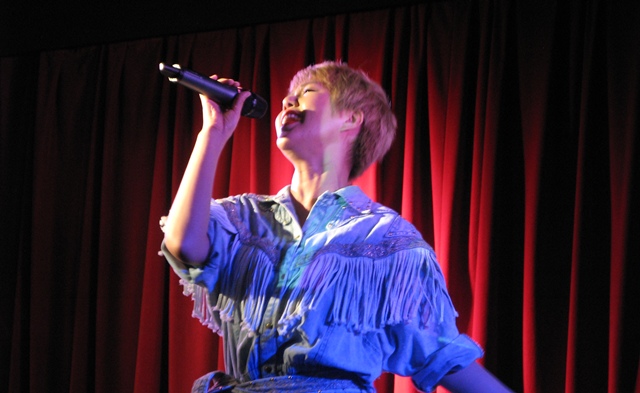| Cinderella girl rewrites her own story |

|

|

|
| Culture | |
| Sunday, 04 September 2011 | |
|
Chinese budding musician Tan Weiwei first appeared in the public eye four years ago as the lucky runner-up of China’s experimental singing contest Supergirl. To meet her again on London’s Soho Theatre stage in a concert in anticipation of her latest album is overwhelming. The sweet Cinderella of 2006 who mastered love songs has now dyed her short hair blond, unleashing her true self in a distinct rock & roll style. Her cooperation with Danton Supple, Jason Boshoff Max Heyes and Damon Minchella in her newest album led her onto an international stage.
A music graduate and professional vocalist, Weiwei has performed internationally prior to her Superstar contest, including at the world-renowned Musikverein Golden Hall in Vienna. Championing the value of fairness through low entry requirements, the popular television contest Superstar played a key role in making Weiwei popular among a wider audience – young generation fans who believe in the Cinderella story.
But Weiwei the Cinderella enjoys pursuing endless challenges rather than the conventional happy ever after. She embarked on a composition journey and returned to the spotlight in 2009 with the release of her first album, which won her recognition as 2011’s “Most Popular Pioneering Female Singer” and the “Best Chinese Language Female Singer” in the eleventh Chinese Language Entertainment Awards. The album’s titular song ‘Tan Moumou’ (meaning ‘someone called Tan’) played a crucial role in recreating her image as the Experimental Rock & Roll Queen. Encouraged by her mentor Gao Xiaosong, a famous Chinese musician and producer, Weiwei wrote ‘Tan Moumou’ in a self-mocking style, teasing the immature and overly-proud girl that comprised of her past. With fast rhythm and provoking words, ‘Tan Moumou’ unfastened the ‘chains’ of social norms and expectations that previously made Weiwei a sweet girl. Charting her journey from an average singer desperate for success to her questioning of her own identities, and finally admitting her inadequacies, the song represents a breakthrough in both Weiwei’s personal and professional growth. For Weiwei, rock & roll is not just music, but a process of atonement.
Indeed, today’s Weiwei has a mature presence amongst her fans, openly sharing her life stories through her songs. From her love of Tibetan culture to her childhood memories of scarecrows in rural fields, to her personal love story and her understanding of British rock & roll, her songs took her audience from one world to the next during her hour-long concert. Her voice echoed with passion and energy.
Weiwei has always loved Britain and its music, with her favourite bands being Oasis and Portishead. Coming to London for the first time to work on her new album, she is overwhelmed to see the Big Ben and British Museum, attractions that Londoners take for granted. She also experienced the famous V Festival, standing and cheering amongst a British crowd. But the most amazing part of the adventure for her is the sincerity with which some people in Britain have treated her. As her two originally planned travel companions had last minute changes of plans, the help Weiwei received from her new friends deeply touched her.
Weiwei returned to China, taking with her treasured memories and a new album. She dreams of visiting London again, bringing to her fans many more songs. “The next project for me is to learn English, so that I can communicate better with British musicians,” she said.
By Cecily Liu |
|








